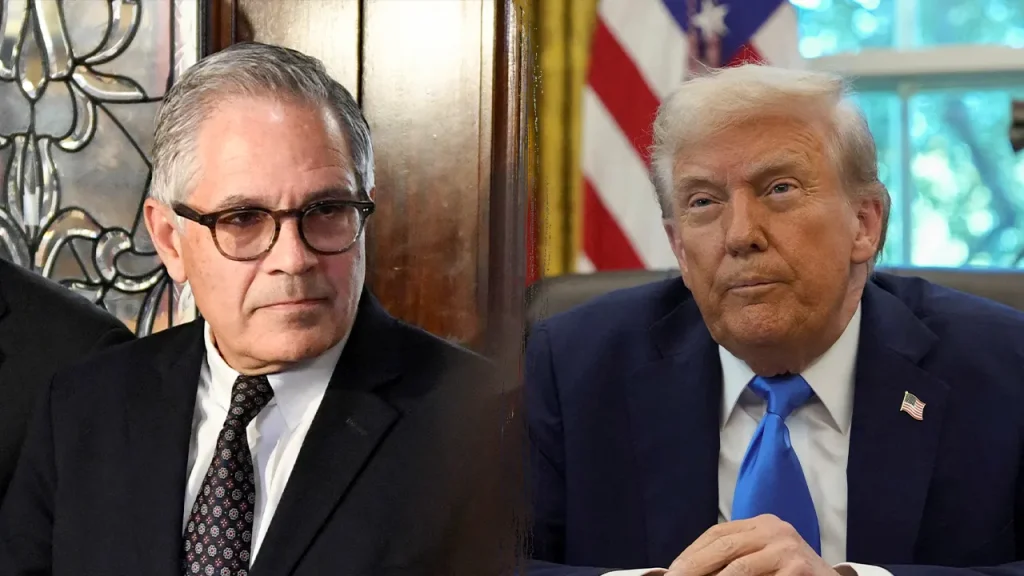District Attorney’s Heated Exchange with Young Republican Activist Goes Viral
In a tense confrontation that has captured widespread attention online, Philadelphia District Attorney Larry Krasner engaged in a heated exchange with Frank Scales, a young Republican activist, in a local park. The video shows Krasner making strong accusations, repeatedly calling Scales “un-American” and stating that “Donald Trump is a fascist.” When Scales, who was filming the interaction, asked why he was being labeled un-American, Krasner responded that it was because Scales “supports people who support hate.” The district attorney continued his impassioned criticism, comparing certain political rhetoric to fascism and even invoking Adolf Hitler, suggesting that “spreading hate, which is something that, frankly, the people you admire do, gets us closer to that.” The personal nature of the exchange escalated when Krasner dismissed Scales as “a 22-year-old who knows nothing” and called his outlet, Surge Philly, a “fake, non-existent paper.” This confrontation has sparked discussions about the increasingly polarized nature of political discourse in America, where disagreements quickly transform into questions about patriotism and character.
The encounter appears to have roots in an earlier incident at a town hall meeting held by Krasner at Salt & Life Church. According to local news reports, Scales participated in what was described as a “brief disruption” during this event, which was part of a series of discussions the district attorney had planned regarding the possibility of President Trump deploying the National Guard to Philadelphia. During that town hall, Krasner had made similarly strong statements about “MAGA members” of the Pennsylvania Legislature, suggesting they don’t believe in equality across various dimensions including race and gender. When Krasner reportedly drew parallels to Adolf Hitler, Scales stood up and yelled “Lie!” adding that “People like you are responsible for the death of Charlie Kirk. Stop calling them fascists.” Scales later explained in a social media video that he hadn’t initially planned to disrupt the meeting but felt compelled to speak out when he realized questions had to be submitted in writing “so they can be vetted and read by a moderator,” which he viewed as turning the event into a “publicity stunt.”
The backstory to this confrontation involves broader political tensions about law enforcement approaches in major cities. As Philadelphia’s progressive district attorney, Krasner has been a controversial figure, with critics arguing his reform-minded policies have contributed to public safety concerns. Scales, representing a conservative viewpoint through his platform Surge Philly, appears to be among those critics. The clash between these two represents the larger national debate about criminal justice reform, with progressives advocating for systemic changes and conservatives often calling for more traditional law-and-order approaches. Adding to this tension is the discussion about potential federal intervention in local law enforcement matters, with Krasner’s town halls specifically addressing the possibility of National Guard deployment in Philadelphia – something Pennsylvania Governor Josh Shapiro has stated the state is “prepared” to respond to should it occur against his will.
The heated rhetoric displayed in this confrontation reflects the increasingly common use of extreme historical comparisons in contemporary American political discourse. Krasner’s invocation of fascism and Hitler represents a trend where political opponents are characterized not just as wrong but as existentially dangerous. Similarly, Scales’ reference to the Charlie Kirk incident (an apparent reference to an assassination attempt against the conservative figure) demonstrates how quickly political disagreements can escalate to attributing responsibility for violence. This kind of language from both sides transforms policy disagreements into moral judgments about character and patriotism. For Krasner, supporting certain political figures means one is “anti-American”; for Scales, Krasner’s characterizations of conservatives as “fascists” represent dangerous rhetoric that could inspire violence against political figures.
The aftermath of this confrontation continued to unfold in the days following the initial town hall incident. According to the report, Scales attempted to attend another of Krasner’s town halls but was allegedly denied entry. Meanwhile, Krasner has maintained his strong criticism of former President Trump, recently urging officials to condemn what he describes as the “politicization of the Justice Department,” comparing it to Watergate. In a public statement, Krasner said, “Justice requires evenhandedness and impartiality in order to function effectively. Sadly, Trump’s actions this week are another example of his toxic assault on constitutional norms.” He further called on other elected officials, particularly local and state prosecutors, to “speak up against this egregious politicization” and characterized Trump’s actions as “an ongoing assault on our democracy” that “must be called out at every opportunity.”
This incident serves as a microcosm of America’s deeply divided political landscape, where face-to-face confrontations between opposing viewpoints quickly escalate into fundamental questions about American values and identity. The exchange between Krasner and Scales demonstrates how difficult productive political dialogue has become in a climate where disagreement is often interpreted as moral failure or lack of patriotism. Both participants seemingly viewed the other not merely as someone with different policy preferences but as someone representing a fundamental threat to American democracy. As videos like this continue to go viral and shape public perception, they risk further entrenching these divisions by reinforcing the notion that political opponents aren’t just wrong but dangerous. This confrontation between a progressive district attorney and a young conservative activist illustrates the challenges facing American political discourse, where finding common ground becomes increasingly difficult when basic assumptions about patriotism and democratic values are contested rather than shared.


